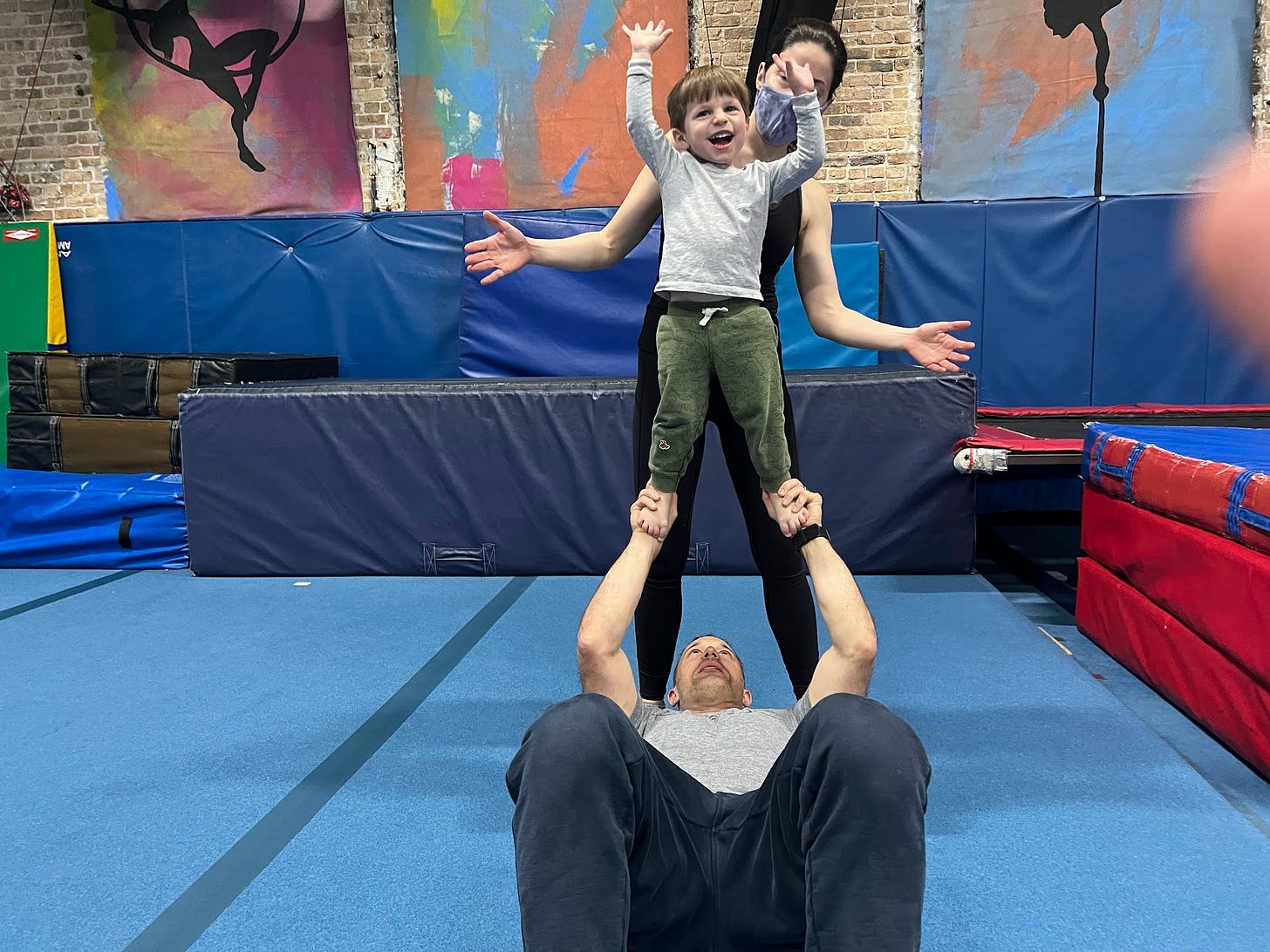🔥Welcome to Volume #00073!🔥
I’m Christian Champ. This is ☯️The Middle Way Newsletter ☯️. It is a place where I write, explore, share, and invite you along for the journey.
If you enjoy the newsletter please share it with your friends.
Please follow The Middle Way on Instagram and Twitter.
I’m also currently writing a daily atomic essay here.
📽️How to Change Our Default Scripts by Rewriting Them to Better Serve Us 📽️
Heading to the airport, I felt the unease building. I got on the train with plenty of time, but the pressure remained. I checked my phone and my watch multiple times during the journey.
A distaste for being late caused me to over-focus on the arrival. A clock counts down in my head, and being five minutes early is of paramount importance.
When I grew up, being extremely timely (ok early) was a way of life for my family. If being the first one to arrive offered rewards, our trophy game would be strong.
Many years of trying to reset this behavior helped, but it still popped its head up. It got better over the years, like a light that keeps dimming.
The challenge is to replace the anxiety and worry with something else. The challenge is rewriting this default script.
It is interesting how scripts and learned behavior follow us in life. They act as a fly that we keep swatting away only to have it land back on our head. We need to kill the fly to finally make it go away.
Becoming aware of our scripts is the first step in killing the fly. Awareness doesn’t guarantee success but is necessary for change.
Once we notice the behavior, we move on to actually changing it.
The next step is eradicating the stress and rush of leaving. If you know you are leaving on time, why build up the emotion around it? Why the increased heart rate and pressure to get out of the door?
The script rewrite starts by instilling a process with a focus on completing the mission. The mission is to leave the house at a particular time, and when we do that we let go of the need to worry about our arrival.
We followed the process and did our part. This released the pressure and stress that never needed to build in the first place. We trade the stress for the process.
Yes, when we fall down on our process, the stress creeps in.
We won’t be perfect, but the goal is getting better over time.
We continue to run the new script until the old one fades into the background and we finally kill the fly.
📓Things to Think About📓
The Browser interviewed Eugene Wei
Eugene left Amazon to go to film school and make films. Following the learning path and continuing to challenge himself and grow is a key part of life for Eugene.
It’s why we all need to find things in work and outside of work to continue to learn and develop around.
I've long felt that it's healthiest when some part of you feels like a beginner and is struggling in some area to make sense of things. There's that saying in Zen Buddhism about the beginner's mind—I believe the term is mushin—and that is something I always want to have. If you go to film school—or any other place where you can repeatedly do some form of craft and make slow, but steady progress—I think that's helpful. When you progress in your business career and become an executive, it's harder to find that. You still want to learn and develop, but you may have fewer opportunities to do so. People tend to recruit you for what you're already good at, and they only want you to do more of that. So for me, it was good to just start over, at the bottom. There's something very meditative about it.
John Vearvake writes about the Four Different Forms of Knowing
Propositional Knowing - “I know”… We know things by having beliefs around propositions. We believe cats are mammals. Most of the knowing today is propositional.
Procedural Knowing - Knowing how to do something. Technical knowledge. I can ride a bike or spar in jiu-jitsu. Procedural memory applies here.
Perspectival Knowing - Knowing through awareness and perception in context. It is the salience of information from a view. e need to experience the thing from this view to get that perspective. We can’t just read about it or watch a movie on it.
Participatory Knowing - Knowing through a shared identity through doing something. Becoming a parent. Becoming a citizen. Similar to perspectival knowing you need to actually participate to get this knowledge.
The challenge we face today is that most knowing is propositional or procedural. Rationality pushes us to those two forms of learning and neglects the perspectival and the participatory knowing. Both of those are essential for flow states and finding those optimal moments in life along with learning, unlearning, and relearning at a faster rate.
It’s like the idea of watching a video about the Grand Canyon and then actually seeing it and hiking it.
If you’re going to cultivate a skill you need to have what you have right here, right now. You need to have a situational awareness, what’s going on here and now. This is your perspectival knowing, knowing what it’s like to be here right now. It’s to have a salience landscape. I’m standing out for you. You left big toe was not very salient to you, until I said that. That which is salient and standing out and what you’re focusing on is relevant and what you’re ignoring is irrelevant. That’s all happening in a highly textured, dynamic fashion right now. This perspectival knowing really matters because we’re having to study it when people are going into virtual reality because it only feels real when things are present to them, when that perspectival landscaping is working properly. It really matters, for example, when you’re doing work like remote scientific work on Mars with rovers. So, this perspectival knowing is ultimately is dependent on your participatory knowing. All the time, and Stoicism really gets at the heart of this, you are doing this in a coordinated fashion. You’re assuming an identity and assigning identities. I am the lecturer you are the audience. There’s an agent-arena relationship that is constantly going on in the basement, the foundations of your cognition. This process of co-identification, that’s your participatory knowing. Who am I? Who are you? What is that? All of these questions are co-defining. For example, this glass is graspable to me but the fact that is graspable is not a property of it. It’s not graspable by a snail. It’s not a feature just of my hand, it’s how my hand and the glass co-identify and fit together that makes me aware of it in a situational awareness, and then I can cultivate skills of how to use it. Once I can use it, then I can make propositions about it.
We tend to stick at the level of our propositions, and exercises like the view from above are designed to drive you down into these deeper levels of knowing. The perspectival and the participatory knowing, where the guts of your identity and the texture of your world is being shaped and made on a moment-to-moment basis. You’re doing it right now.
Willingness to Look Stupid by Dan Luu
This concept of looking stupid or thinking you look stupid is an amazing cheat code. When you don’t care what people think, you can create small advantages and grow at 1% compounding.
Similar to rewriting our default script, when we don’t worry about what other people think, we can focus on knowledge and understanding
The benefit from asking a stupid sounding question is small in most particular instances, but the compounding benefit over time is quite large and I've observed that people who are willing to ask dumb questions and think "stupid thoughts" end up understanding things much more deeply over time. Conversely, when I look at people who have a very deep understanding of topics, many of them frequently ask naive sounding questions and continue to apply one of the techniques that got them a deep understanding in the first place.
Instead of making excuses, ask why the outcome took place. Ask what you can do differently next time?
I think I first became sure of something that I think of as a symptom of the underlying phenomenon via playing competitive video games when I was in high school. There were few enough people playing video games online back then that you'd basically recognize everyone who played the same game and could see how much everyone improved over time. Just like I saw when I tried out video games again a couple years ago, most people would blame external factors (lag, luck, a glitch, teammates, unfairness, etc.) when they "died" in the game. The most striking thing about that was that people who did that almost never became good and never became great. I got pretty good at the game3 and my "one weird trick" was to think about what went wrong every time something went wrong and then try to improve. But most people seemed more interested in making an excuse to avoid looking stupid (or maybe feeling stupid) in the moment than actually improving, which, of course, resulted in them having many more moments where they looked stupid in the game
🎧Things to Listen, See, and Watch 🎧
🎵This week’s newsletter was crafted while listening to this mix from Lane8 at Red Rock.
💣Words of Wisdom💣
Small Arcs of Larger Circles - Nora Bateson
When we look through the lens of interdependency, it is impossible to separate individuals from their contexts of influence and experience. This blurs the ‘hero’s story.’ Leadership, then, can better be attributed to the town or village that nourished a person than to that person’s individual qualities.
"When it comes to storytelling, though, it’s the most interested who inherit the best stories." (Bernadette Jiwa, What Great Storytellers Know)
The Way of Kings - Brandon Sanderson
"The purpose of a storyteller is not to tell you how to think, but to give you questions to think upon. Too often, we forget that.”
James Baldwin -
“The purpose of art is to lay bare the questions that have been hidden by the answers.”
Creativity - Mihaly Csikszentmihalyi
"Life is nothing more than a stream of experiences—the more widely and deeply you swim in it, the richer your life will be."
The Obstacle Is the Way - Ryan Holiday
"There is no good or bad without us, there is only perception. There is the event itself and the story we tell ourselves about what it means."
Marshall McLuhan
"Each form of transport not only carries, but translates and transforms the sender, the receiver, and the message. The use of any kind of medium or extension of man alters the patterns of interdependence among people, as it alters the ratios among our senses."
A Field Guide to Getting Lost - Rebecca Solnit
"The question then is how to get lost. Never to get lost is not to live, not to know how to get lost brings you to destruction, and somewhere in the terra incognita in between lies a life of discovery."
🙏Thanks for reading🙏
What scripts do you need to rewrite? What process can you put in place to change your relationship with a script and make the edit stick?
How can you kill the fly?
Any thoughts or comments, please share!
Namaste,
Christian
Isaac leveling up his acro-yoga game.
















Share this post